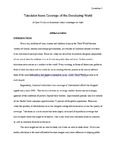Television News Coverage of the Developing World: A Case Study on America's news coverage on Haiti

View/
Author
Laventure, Alisha G.
Subject
Washington and Lee University, Shepherd Poverty Program
Poverty
Television broadcasting of news
Haiti
Foreign news
Disasters -- Press coverage
Broadcast journalism -- Authorship
Professional ethics
Metadata
Show full item recordDescription
Alisha G. Laventure is a member of the Class of 2009 of Washington and Lee University. Capstone; [FULL-TEXT FREELY AVAILABLE ONLINE] The news might not tell us what to think, but it tells us what to think about. Of all mass media, television is the most influential because images carry more influence in shaping public opinion than words. Using Haiti as a case study, this paper will compare television coverage of international affairs between the leading public (PBS), network (NBC, ABC CBS) and cable (FOX, CNN) television news sources during their primetime or evening broadcasts. I have chosen to use Haiti for two reasons: it is the poorest country in the Western Hemisphere, and the United Sates has been Haiti‘s largest donor of foreign aid over the past three decades. The study will examine coverage over a 5-year period starting from January 1, 2004 through December 31, 2008. I will then address common criticisms of television and determine trends in the amount of news content devoted to Haiti, as well as the depth, consistency and merit of coverage of the country‘s affairs. I will reference the writings of Thomas Pogge in assessing the merit of coverage. Finally, I will suggest remedies to improve the state of America‘s television coverage of international news. [From Introduction] Alisha Laventure